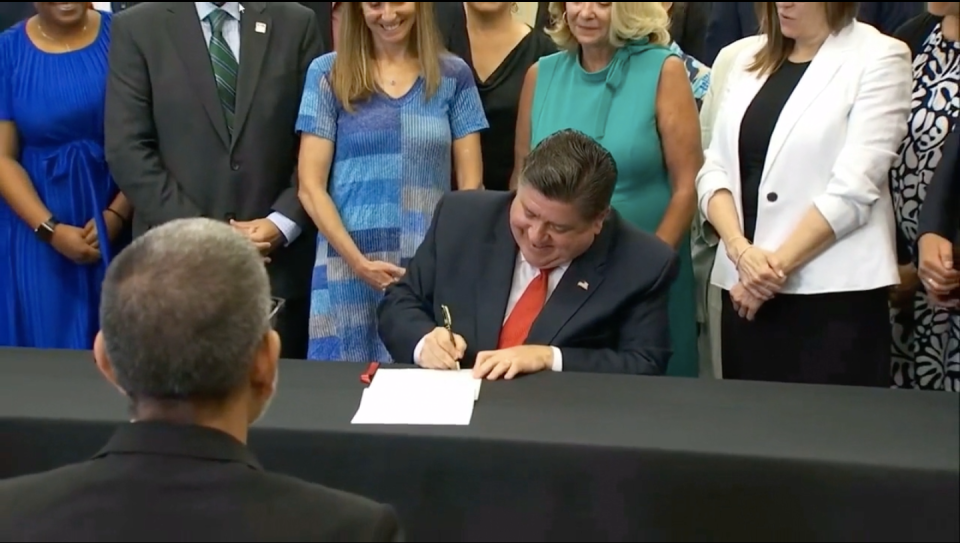Illinois' new carbon capture law sets 'national standard,' says Pritzker
- Oops!Something went wrong.Please try again later.
A result of years of negotiations among environmental groups and labor and business interests, Gov. JB Pritzker signed legislation creating new regulations on carbon capture and sequestration Thursday.
Senate Bill 1289, also known as the Safe CCS Act, passed in the Illinois General Assembly during the final days of the spring session, 78-29 in the House and 43-12 in the Senate, largely along party lines.
It represents a compromise that even some of its supporters say will likely need to be revisited, but its establishment of a two-year moratorium on the construction of carbon dioxide pipelines and broad array of regulations put forth a foundation for primarily Democratic lawmakers to feel comfortable moving forward.

For Pritzker, the bill he signed into law at Richland Community College represents a potential major economic boon for the state while taking concrete steps at reducing carbon emissions. His office had been particularly involved in putting together the legislation.
"It was not easy, there were times when we didn't think we'd get this done," he said, calling the law a new "national standard" during a press conference. "It took a lot of hard work, a willingness to compromise and bipartisanship — all the things that we ought to expect from our elected officials but sometimes don't get."
"Just as importantly, we got this done with a sincere commitment to addressing the challenge of climate change," he added.
More: Illinois Republicans elect new party chair as party rallies behind Trump in Milwaukee
The moratorium on carbon dioxide pipelines would run until July 2026 or when the federal Pipeline and Hazardous Materials Safety Administration adopts revised safety regulations, whichever comes first. The agency promised to do so after a 2020 pipeline burst occurred in Satartia, Mississippi that hospitalized over 40 people and forced more than 200 evacuations.
The pipe burst in Satartia has been often cited for a reason for opponents to urge the Illinois Commerce Commission to not approve petitions from pipeline manufacturers, petitions they ultimately withdrew. Several county boards in central Illinois, including Sangamon County, issued their own moratoriums when Navigator Heartland Greenway was seeking approval to construct its 1,350-mile pipeline spanning five states largely out of concerns that another burst could occur.
Still, pipeline supporters say the technology has been proven safe and point to Decatur-based food processing company Archer Daniels Midland and a new pilot project constructed at City, Water, Light and Power Dallman Unit 4 as evidence.
The law also requires pipeline companies to show their pipelines will lead to net reduction in climate pollution and don't add co-pollutants in the atmosphere. Additionally, the state will collect an annual fee issued on sequestration operators based on how much carbon dioxide they store.
More: Compromise on carbon dioxide pipelines leaves groups out, Illinois farmers say
At the crux of detractors', such as the Illinois Farm Bureau, position were concerns for property rights and just compensation. The law sets no limit on the use of eminent domain for pipeline operators to secure the land above pore space, where the carbon dioxide is stored underground, and allows them to move forward with their project if they receive approval from 75% of affected landowners.
Others said protections for drinking water supplies such as the Mahomet Aquifer were practically non-existent. Bill sponsor and state Rep. Ann Williams, D-Chicago, pushed back on that assertion saying on Wednesday that the bill was "all science-based and not talking points or fearmongering."
"We would not have passed, and I would not have signed this bill, if I did not believe both the consideration of the Mahomet Aquifer and the potential for further protections did not exist," added Pritzker.
Sen. Dave Koehler, D-Peoria, told The State Journal-Register at an unrelated event in Bartonville prior to the bill signing that the bill did not solve all the problems although voting for it. Asked for how quickly the legislature could act in possible amendments, he projected not until the 2025 spring session.
Lawmakers will return to Springfield for the fall veto session in November for two weeks following the election.
Contact Patrick M. Keck: pkeck@gannett.com, twitter.com/@pkeckreporter
This article originally appeared on State Journal-Register: Illinois' new carbon capture law among nation's best, says Pritzker

